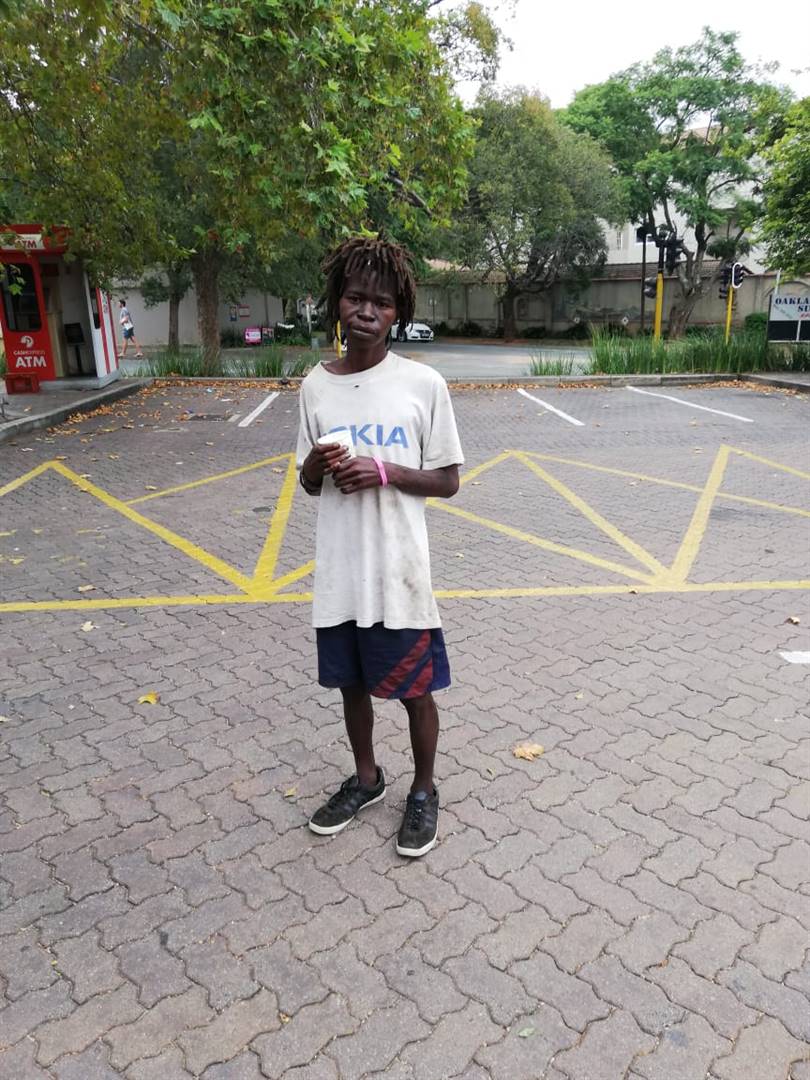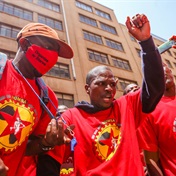As most people in South Africa prepare for another week in their homes under the national Covid-19 coronavirus lockdown, Amy Green spoke to some of Johannesburg’s many homeless people about why they choose life on the street over government shelters.
As South Africa moves towards what is expected to be the last week of a five-week Covid-19 coronavirus national lockdown, Spotlight spoke to some homeless people in Johannesburg about life on the streets. The individuals we spoke ti choose the streets over shelters despite allegedly experiencing police brutality and increasingly colder weather as winter approaches.
Alleged police brutality
On March 30, 28-year-old Lindokuhle Buthelezi says he was woken up by the sun from his makeshift bed near the highway onramp on Glenhove Road in Oaklands, Johannesburg. Between 7am and 8am he took up his usual position at the intersection of Glenhove Road and Central Street, standing next to the robot to plead with the drivers to spare some change.
Buthelezi was well aware that his presence was even less desirable than usual, considering that under the national lockdown instituted only a few days earlier to reduce the spread of Covid-19, living on the streets was effectively banned. He, and many of his friends, had been taken to a shelter near Hillbrow the day the lockdown came into force. However, after only a day, he decided that those living conditions were worse than the streets and he returned to the space he calls home.
But this Monday, as the robot turned green, he noticed that the only vehicle on the road remained stationary. Its only occupant, an off-duty police officer still in his uniform, paused for a few seconds while Buthelezi crossed the road. Buthelezi says he did not see the officer get out of his car and run up to him. He only realised this when he felt a blow to the side of his head.
READ: Covid-19: Concerns mount over plans to protect prisoners
“He hit me and I fell down. He pressed me [down] with his foot on my neck and I could not breathe. He kicked me and kicked me. He tell me he don’t want me in streets. He tell me [President Cyril] Ramaphosa said he must do that to me,” (sic) Buthelezi told Spotlight.
The alleged incident shook Buthelezi enough for him to move to another intersection, but not enough for him to return to a shelter.
Cornell Hennessy (38) moved to Johannesburg from Durban only a few days before the national shutdown started. He showed Spotlight a swollen bump on his right arm, an injury he said was caused by rubber bullets fired by police in town at the start of the shutdown.
SA Police Service (SAPS) spokesperson, Brigadier Vishnu Naidoo, said he could not comment on both incidents as they had not been reported to the police.
Despite this, Hennessy is on the streets begging for money. He said it was worth the risk considering how desperately his family needed the money.
“I have a three-month-old daughter and my wife is dry, she doesn’t have milk. The shelter doesn’t provide milk so I need to make money so my baby doesn’t starve. This is the most stressful time for us because [milk] formula is so expensive,” Hennessy told Spotlight at the intersection of Glenhove and Oxford roads.
Fewer cars mean less money
Hennessy’s task has been made that much more difficult as fewer cars on the road during the lockdown means less money for him and his peers. Fanwele Shiba (28), also stationed at the same intersection, told Spotlight that daily earnings of about R80, have dropped by more than half. He said he would be “lucky” to get R30 a day under the lockdown. Both Shiba and Hennessy were taken to a shelter in Hillbrow called 3 Kotze. “They didn’t feed us there,” said Shiba. “They gave us three slices of bread. That’s it, the whole day.”
He said that 100 men were crammed into a room meant for 30 people with no blankets. “I know this virus is dangerous and can affect us anytime, anywhere. I also know we shouldn’t be so many people in such a small space, and that there should be masks, gloves and sanitisers – there wasn’t anything like that there,” said Shiba.
175 temporary shelters
City of Johannesburg spokesperson Nthatisi Modingoane told Spotlight that he had not “received any reports of police brutality and we have worked tirelessly to get people off the streets”. He did however admit that the city experienced overcrowding problems in shelters since the lockdown started. “We have now allocated more spaces for homeless people, largely in 175 recreation centres across the city,” he said.
According to Modingoane the city has also partnered with several non-governmental organisations to resolve the food shortages at these facilities.
“The problem is that people want to go back to the streets, and we have deployed social workers to try to convince people to heed the calls for a lockdown. But when people are used to being free in the streets, it is very difficult for them to change their ways,” he said.
“They don’t understand our lives”
Johannes Khumalo, who lives and begs at the intersection of Glenhove Road and Central Street, told Spotlight that “those shelters are not for me”.
“I wasn’t fed for three days [at the shelter], only got some bread. I will not go back,” he said.
The 11 friends him nodded in agreement.
Khumalo witnessed the incident between the police officer and his friend Buthelezi. “I will continue to sleep on the streets. I just hope the cops can respect us and leave us alone. They don’t understand our lives,” he said.
Khumalo and many of his friends are addicted to drugs and for them this issue supersedes the need for isolation under the lockdown. In the shelter they can neither attain drugs nor the money to buy drugs.
This is my home now
Tsepho Msibi (32) said he was not using drugs, but he would not return to the shelter based on his first experience there. “There was not enough food and no blankets,” he told Spotlight from his station at the intersection of Glenhove Road and Oxford Road.
“I know about corona and that we should wear gloves and masks,” he said.
He wore one blue glove on his right hand. Although it was past midday when we met, he had only made R8.50. “I’ve spent seven years on the streets and this is my home now,” he said. “I just pray I can make enough money for pap today.”
As the robot turned green, he walked to the opposite intersection to ask the driver of the single car at the red robot for spare change.
Relief?
On Tuesday this week, President Cyril Ramaphosa addressed the nation on measures government is taking to mitigate the impact of the pandemic that “has resulted in the sudden loss of income for businesses and individuals alike”.
The second phase of government’s economic response to the outbreak includes a “massive social relief and economic support package of R500 billion”.
This package will be directed to supporting health initiatives, combatting hunger and protecting wages. Government has introduced a six-month coronavirus grant the most “vulnerable families”.
Existing social grants will be increased for this period and unemployed people will access a R350 social relief of distress grant over the next six months. At the time of writing, it was still unclear how individuals and the homeless such as Msibi, Hennessy and Khumalo, would access this grant or if they qualified.
The department of social development will brief members of Parliament in a joint (virtual) meeting of the Portfolio Committee on Social Development and Select Committee on Social Services on Thursday at 10am to unpack the new relief efforts.
* This article was produced by Spotlight – health journalism in the public interest. Like what you’re reading? Sign up for our newsletter and stay informed.




 Publications
Publications
 Partners
Partners










